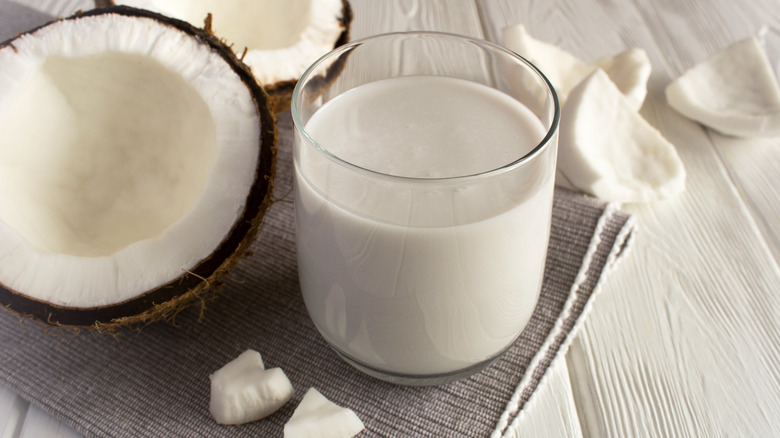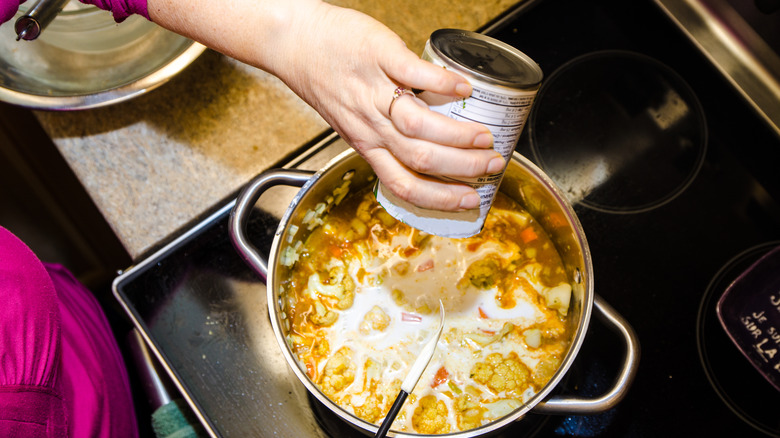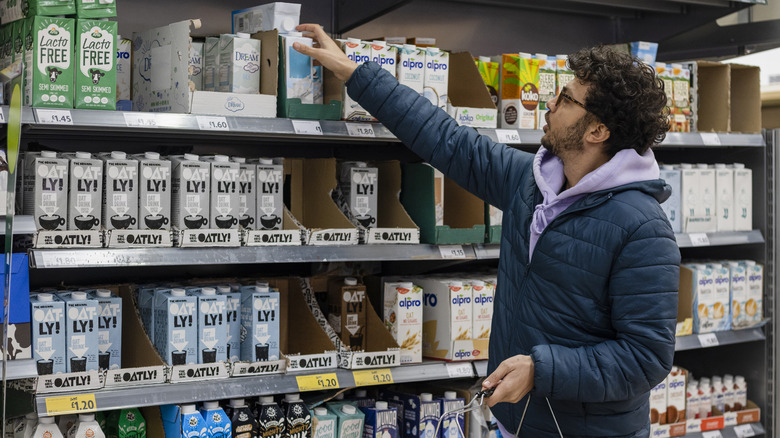When To Use Canned Coconut Milk Vs. Boxed
With its rich flavor and creamy texture, coconut milk can be a wonderful alternative to cow's milk. This naturally sweet liquid comes from the flesh of mature coconuts and contains at least 10% fat. One of the best things about coconut milk is that it can replace both coconut cream and coconut water, depending on its composition. For example, canned coconut milk is high in fat and has a thick consistency, making it suitable for cooked meals such as soups, stews, and curries. But if you want to quench your thirst, buy coconut milk in a carton. This beverage is high in water and low in fat, with a thin consistency. Therefore, it's ideal for smoothies, protein shakes, and breakfast cereals.
However, that's not the only difference between canned and boxed coconut milk. Each of these products has a distinct flavor and nutritional value, as well as different ingredients. Both varieties may work in some but not all recipes that would otherwise call for milk or heavy cream.
Canned vs. carton coconut milk: When to use each
Canned and carton coconut milk have the same main ingredient but differ in flavor, texture, and composition. For starters, canned coconut milk is 73% water and boasts 48 grams of fat per cup, depending on the brand. Therefore, it's thicker and denser than cartoon coconut milk, which has around 35 grams of fat per cup. Its high fat content makes it ideal for puddings, dips, Thai and Indian dishes, pies, and other meals or snacks with a rich texture. It can be a delicious addition to coconut brown rice recipes, ranch dressing, ice cream, and casseroles.
The coconut milk sold in cans also has a more intense coconut flavor than other varieties. For this reason, it's often used in piña coladas, margaritas, butter mochi, cheesecakes, and other meals or beverages with a pronounced coconut taste. Additionally, it has a long shelf-life and can last up to five years if left unopened. Alternatively, transfer it to a jar or bottle and freeze it for up to three months.
By comparison, cartoon coconut milk has a milder flavor and lighter consistency, similar to cow's milk. This makes it suitable for coffee, tea, pancakes, and chia pudding. It's also worth mentioning that carton coconut milk is diluted with filtered water and may contain sugar, sorbitol, preservatives, and natural flavors. That's not the case with its canned counterpart, which usually has just two or three ingredients, such as coconut milk, water, and guar gum.
Choose the best coconut milk for your needs
Both coconut milk varieties can elevate your cooking, but each has different uses. (And no, you can't substitute carton coconut milk for canned, or the other way around.) Generally speaking, carton coconut milk works best in drinks and light sauces. Think of it as a vegan alternative to cow's or goat's milk. But if you need a substitute for heavy cream, use canned coconut milk in your recipes.
Another option is to dilute canned coconut milk and then mix it into coffee, tea, or smoothies. Ideally, choose a brand with no added sugar, sweeteners, or preservatives. Also, note that canned varieties may contain bisphenol A (BPA), a chemical linked to high blood pressure, heart disease, diabetes, and birth defects. Carton packaging doesn't contain this compound, so it's safer overall. Additionally, coconut milk in UHT cartons has a more pronounced flavor, which makes it perfect for lattes, frappes, iced coffee, and cocktails.
You can also make homemade coconut milk by blending 2 cups of shredded coconut with 4 cups of hot water. Add a pinch of salt, sugar, vanilla extract, cocoa powder, or cinnamon for extra flavor. Let the mixture rest for 10-15 minutes, blend it again, and strain it through a cheesecloth. Transfer the liquid to a Mason jar and use it right away or refrigerate it for later use. Adjust the amount of water based on how you plan to use the coconut milk.


